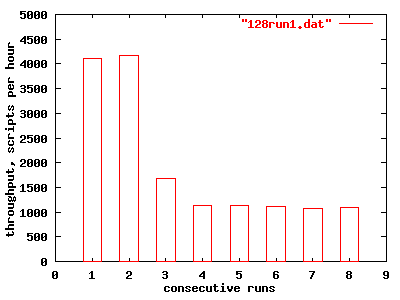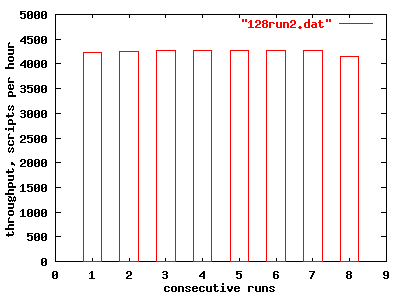
Linux Scalability Project
Status report for March and April 1999
Center for Information Technology Integration
School of Information at the University of Michigan
The primary goal of this research is to improve the scalability and robustness of the Linux operating system to support greater network server workloads more reliably. We are specifically interested in single-system scalability, performance, and reliability of network server infrastructure products running on Linux, such as LDAP directory servers, IMAP electronic mail servers, and web servers, among others.
Summary
Several performance-related kernel issues were detected and fixed during this two month period. As a result our visibility in the Linux community is improving. We made more funding contacts. Work continues on long-term projects.Milestones
Challenges
Mindcraft, and the truth about Linux performance
Recently, Mindcraft, an independent testing service, released a report [http://www.mindcraft.com/whitepapers/nts4rhlinux.html], sponsored by Microsoft, comparing the performance of Windows NT and Linux when serving Samba files and web pages from a Pentium-based SMP hardware platform. The comparison was not positive towards Linux. The Linux community immediately examined the results, finding that there were several inexcusable biases. As well, there is an on-going discussion (argument?) between several Linux kernel developers, and Mark Russinovich, a well-known expert in Windows NT performance. The greatest concern to the community is dispelling FUD -- Fear, Uncertainty, and Doubt -- one of the most oft-wielded weapons that Microsoft, and many others, have in their arsenal.
It is important for those of us who wish to develop and successfully market products that run on the Linux platform to have a good understanding not only of the real performance issues, but also to see clearly through FUD tactics and to be able to combat them by providing well-researched, reasonable, and clear explanations of the issues.
So often, FUD inspires passionate arguments among technical folk that can't be followed by the people who are the real targets of FUD -- managers and purchasers. Managers and purchasers often ignore these arguments because they don't understand them, and thus FUD goes unchallenged. Linux itself doesn't have a marketing machine, so it is vulnerable to this kind of attack.
Of course, most managers worth their salt have one or two technical people they trust to explain these issues in terms they can understand. It is likely that this is how Linux has made inroads into enterprise cultures in the first place. This is probably the best way to begin injecting real information about Linux.
I'm not suggesting counter-FUD (spreading misinformation about NT) or covering up Linux's problems, most of which are already familiar to Linux kernel developers. However, clearly identifying known problems and stating plans for fixing them would probably be very reassuring to technologists and managers who are responsible for running enterprise infrastructure. The Linux community should provide a common location for advertising these issues and diagramming the community's response to them. As well, projects like ours should provide as many publicly accessible and scientifically valid performance studies as we can. And finally, software companies like Netscape should become directly involved in understanding these issues, and training their sales staff to respond to them accurately when customer questions arise.
Managing Change: Meeting our goals during organizational and personnel changes
In the past two months, our project has muddled forward in the midst of grand organizational change at Netscape, as well as expansion and change of the project itself. The Linux Scalability project is now attached to the Sun-Netscape Alliance, within AOL. Tim Howes, one of the original authors of the project, is now spending most of his time with the AOL technology office. Our local cadre of students will be changing shape as Spring-Summer term begins here at U-M. In addition, more sponsors are becoming involved with the project.
Teus Hagan of NLNet warned of the dangers when he visited with us in April: as more sponsors become involved, it is possible that they will all be interested in different and incompatible goals. It was difficult to get agreement among the original sponsors and participants about our project work scope. It is critical to the goals and identity of this project to be sure that new people and organizations who become involved with the project in the near future have a good grasp of our goals.
Performance graphs
Work on the Linux buffer cache resulted in a fix that prevented a significant buffer leak (and resultant low-memory scenario). The first graph shows eight consecutive runs without the fix; The second graphs demonstrates the improvements in benchmark performance with our fix.

Copyright 1999